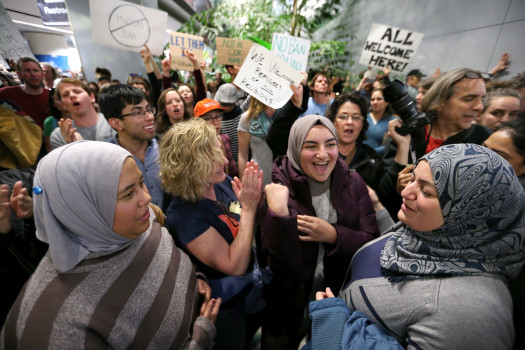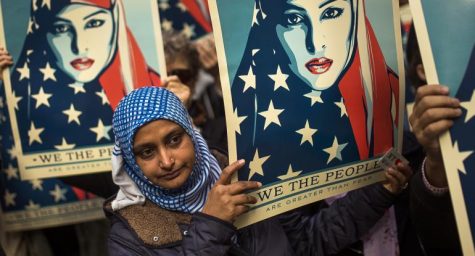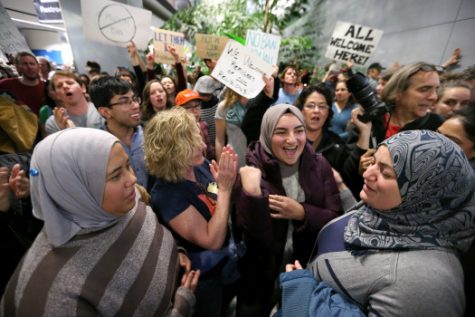The Outcome of Trump’s Muslim Ban

From left, Khaleah Tahan, of Daly City, Kerry McCracken, of Oakland, Bayan Tahan, of Daly City and her mother Rawa Alchalian, of Daly City, protest with hundreds of other people against the detention of Muslim refugees at San Francisco International Airport in San Francisco, Calif., on Saturday, Jan. 28, 2017. Tahan has family from Syria, they said. U.S. President Donald Trump signed an executive action prohibiting Muslims from entering into the United States. (Ray Chavez/Bay Area News Group)
In his first few weeks in office, President Trump wasted no time signing executive orders. On January 27, in the Hall of Heroes at the Department of Defense, Trump signed an executive order that “temporarily prohibits from entering the United States virtually all people traveling on passports from Iraq, Syria, Iran, Sudan, Libya, Somalia and Yemen.” The order has many flaws, including Trump’s motive for the order, which seems to be to limit Muslims entering the country. This matters because the First Amendment “respects an establishment of religion, or prohibiting the free exercise thereof.” If Trump acted for harming Muslims, then he violated the Constitution. Senior Justice Moore stated, “This is discrimination at its worst.”
The list of targeted countries is Iraq, Iran, Libya, Somalia, Sudan, Syria, and Yemen — all Muslim-majority countries. According to Vox, “Trump’s order says that it protects American people from the threat of terrorism,” however, many feel it will not reduce terrorism, and it is possible that the ban could increase the threat. The two main motives for terrorism are social and political injustice and the belief that violence or threats are effective in change, according to Amy Zelman, global terrorism expert. It is also possible the ban could be motivation to provoke attacks against America, as many of the countries on the banned list are upset. Moore says, “Muslim countries have a lot on their hands with terror attacks as well, which is why they flee to America.”
Even if the ban was to reduce terrorism, targeting the countries Trump has chosen is flimsy reasoning. Muslim countries excluded from the list are several wealthier Muslim majority countries where the Trump Organization has business interest like Saudi Arabia, Lebanon, Turkey, the UAE, Egypt and Indonesia, all countries with ties to terrorism. According to NPR, “Trump has significant commercial interests in Turkey and Azerbaijan, is developing properties in Indonesia and Dubai, and has formed companies in Egypt and Saudi Arabia.” His company is also looking at “multiple opportunities in Dubai, Abu Dhabi, Qatar, Saudi Arabia — the four areas where we are seeing the most interest,” according to his daughter, Ivanka. It appears that the ban only targets Muslim countries where Trump doesn’t do business, which creates a conflict of interest and makes Trump’s reasoning look highly suspect.
This ban was also especially controversial because it insults the Muslim community in America. Junior Hamna Zafar, who is Muslim herself, says, “It is unfair to the Muslims who come here for job opportunities.” She believes that even the proposal of this ban “destroys the image of the America being the land of the free.” She also adds that as a natural born citizen of the U.S., but who has family overseas, the ban could affect her family. The ban is also more controversial because of the decision to let Christians from those countries in and keep the Muslims out. This insinuation of Muslims and Islam associated with danger to the country is also an insult to the Muslim people. Clarie Seaton says she, “Hates the people who say Islam isn’t a religion of peace when none are.”
While the ban has brought a lot of negativity among the American people, it has also produced some positive outcomes. Since the ban, Americans of all different races and cultures have sent harsh backlash in opposition to the executive order, retaliating against its unfairness. People have come together all over the country calling for the ban to be lifted with protests and sharing how the ban has affected them. People even protested in the airports where people coming from banned countries were detained. The ban challenged American citizen’s ability to stand together and fight for what they believe is just, and the people did not disappoint. More than 4,000 lawyers are working in airports around the country advocating for travelers of the countries banned.

Among all havoc, eventually, the American people were heard. Judge James Luis Robart grabbed national headlines with his decision to lift Trump’s week-old travel ban for citizens of seven mainly Muslim countries. Judge Robart is a man interested in the law and fairness. with over 30 years experience. According to Independent news, he has put a hold on the government before, “in 2011, Judge Robart put a temporary hold on a state rule change that would have cut government funding for disabled children and families in Washington.” People like Judge Robart are a reminder of hope that the American people can expect to challenge injustice that can affect the lives of the American people.
Trump’s decision to sign the executive order has left a bad taste in the mouths of Americans that are Muslim, Muslims in general, and minorities. The ban gave the public eye a reminder and a clear view of Trump’s motives and the power he truly has over America.


